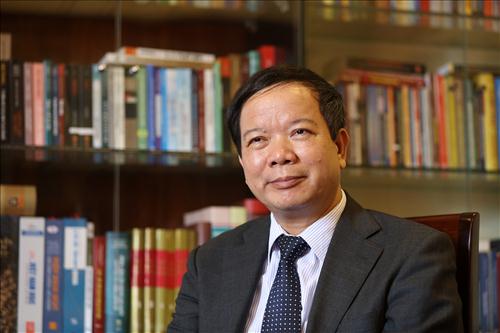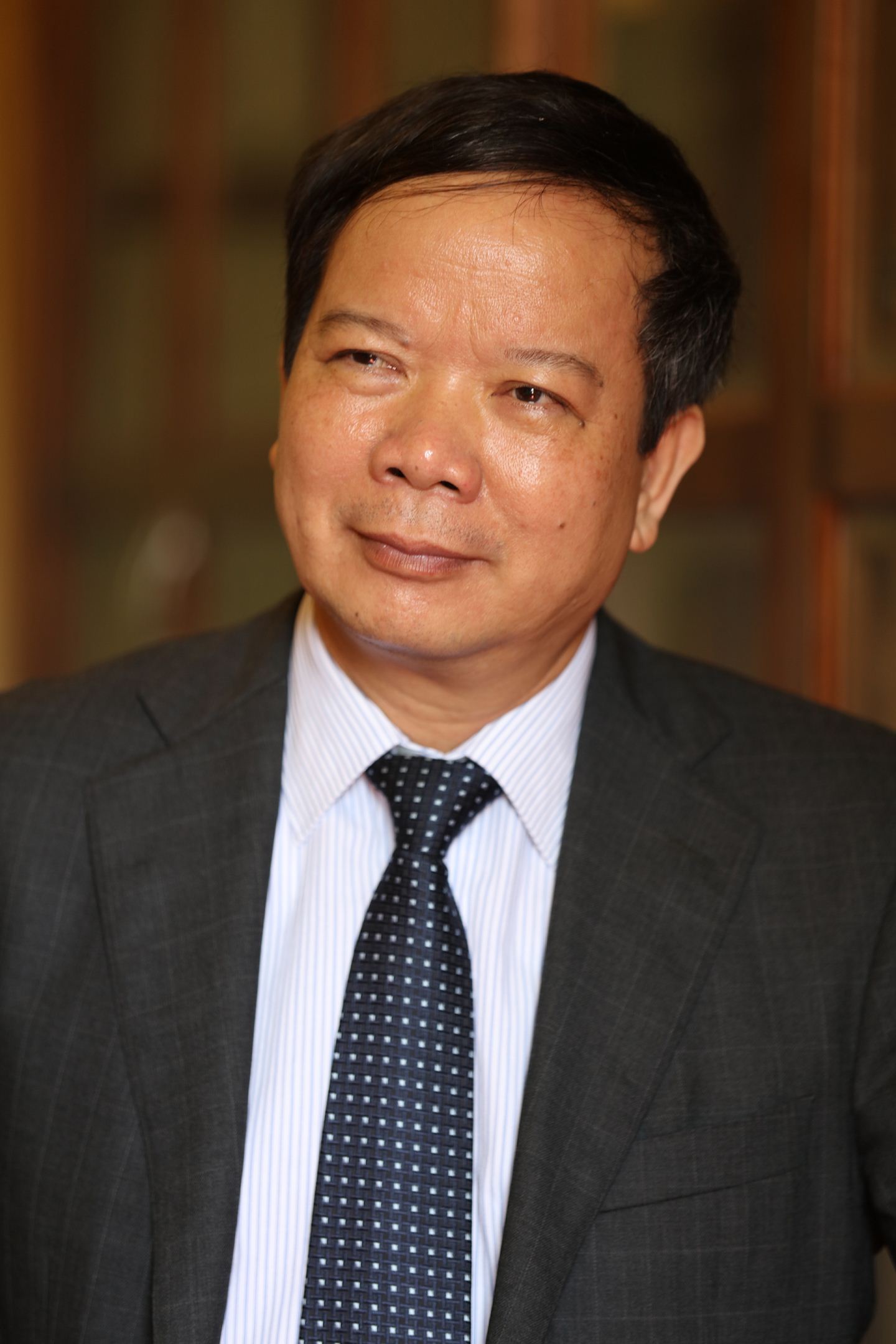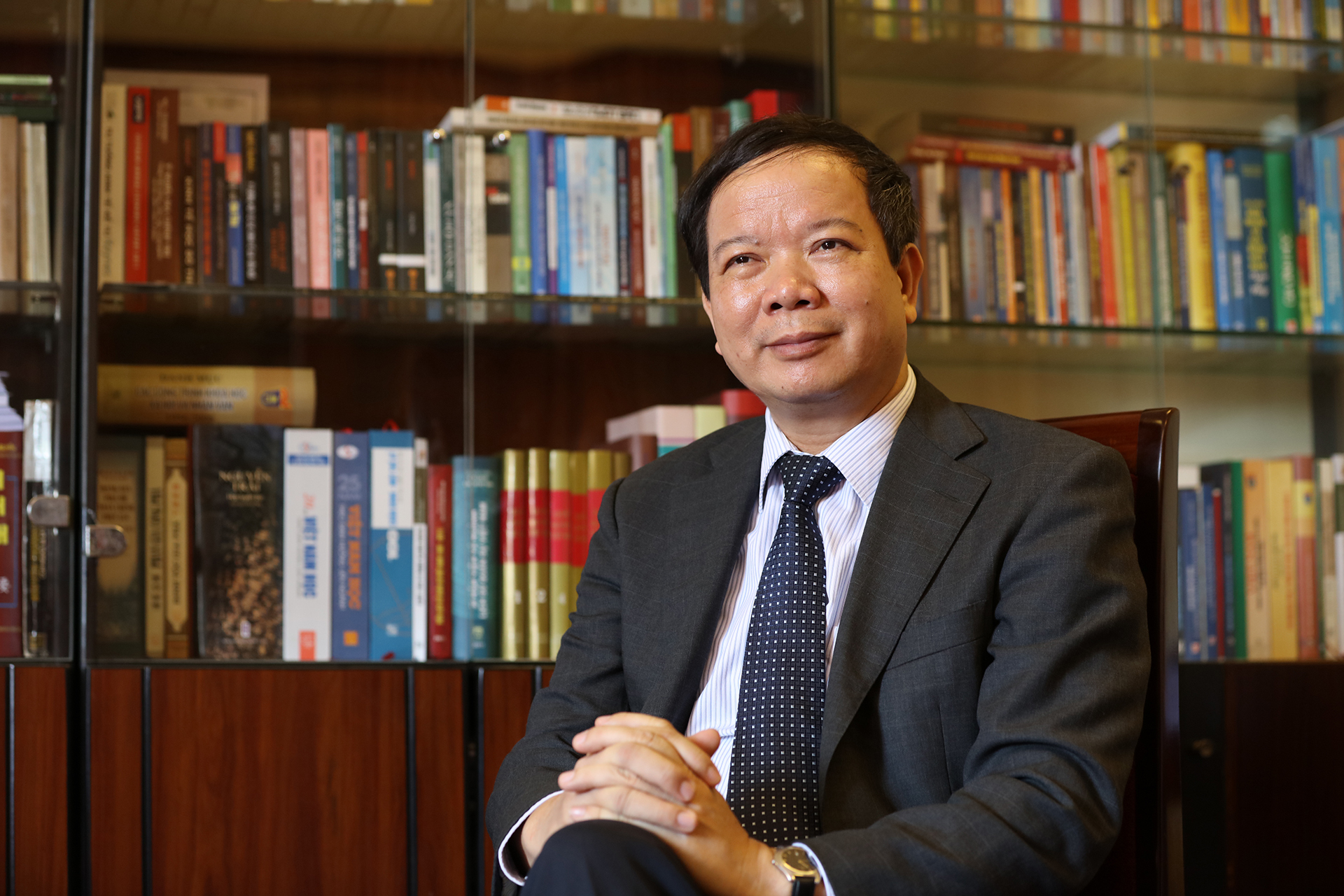
From Japanese Studies to Japanese Studies
As a student of the 26th course of the Faculty of History, Hanoi University of Science, after graduating from university, he was retained at the school to do teaching and research and has been associated with Hanoi National University and then the University of Social Sciences and Humanities from 1986 to present.
The country was in renovation, international relations were becoming more open, considering himself a member of the "lucky" generation, from 1990 to 1999, the young lecturer actively taught at the Faculty of History and worked as a scientific assistant for Professor Phan Huy Le at the Center for Vietnamese Studies and Cultural Exchange (the predecessor of the Institute of Vietnamese Studies and Development Sciences, VNU-Hanoi today). It was in the academic environment of the Faculty of History and the Center that lecturer Nguyen Van Kim had the opportunity to learn from many famous teachers and scientists such as: Dinh Xuan Lam, Phan Huy Le, Tran Quoc Vuong, Ha Van Tan, Vu Duong Ninh, Phan Dai Doan, Nguyen Thua Hy, Nguyen Quoc Hung, Vu Minh Giang, Nguyen Quang Ngoc,... and at the same time met and received knowledge from international scientists, especially Japanese historians and archaeologists such as professors: Sakurai Yumio, Furuta Motoo, Kikuchi Seiichi, Momoki Shiro... The knowledge accumulated during the years of studying in the country and the time studying and researching in Japan (Kanazawa University, 1992-1993; Tokyo National University, 1995-1996 and 2000-2001) along with the serious attitude, passion for science, high responsibility of Japanese scholars as well as historical thinking, research methods. Japanese scientific research... has inspired the young researcher to delve deeper into Japanese history, especially the modern period.

Professor, Dr. Nguyen Van Kim/Photo: Bui Tuan
With the guidance and assistance of many Vietnamese and Japanese scientists, lecturer Nguyen Van Kim focused on researching Japanese History in the Edo period (1600-1868), focusing on the policy of national isolation (sakoku) that the Tokugawa shogunate pursued. Doctoral thesisJapan's Closed-door Policy During the Tokugawa Period - Causes and Consequenceswas successfully defended at Hanoi National University in 1999 under the guidance of Professor Vu Duong Ninh and the professional advisor of Professor Sakurai Yumio. The thesis has contributed to clarifying a question in the research community as to why and in what context, while pursuing a seclusion policy, Japan still had many fundamental and outstanding developments. Thanks to that, in the 18th-19th centuries, Japan escaped the common "historical destiny" of Asian peoples to be conquered and enslaved by Western powers. Moreover, Edo is also considered the period of the highest development of the Japanese feudal regime. This is the pivotal period, preparing the essential conditions and premises for the establishment of the first modern state in Asia.
Those new and bold perceptions and interpretations in the research work were highly appreciated by the Doctoral Thesis Evaluation Council and the Scientific Award Council of the Vietnam Historical Science Association. Dr. Nguyen Van Kim was honored to receive the award from the Vietnam Historical Science Association and the Pham Than Duat Historical Award Fund.Second(no First Prize, 2000) for an excellent thesis. Along with that, the monograph developed from the thesis published by The Gioi Publishing House in 2000 was commented by famous historians such as Professor Phan Huy Le and Professor Sakurai Yumio as the first work written about the Japanese feudal regime, contributing to building the foundation for the Japanese studies field which was still very new in Vietnam at that time.
In the following years and up to now, Professor Nguyen Van Kim has continued to research on Japan, but the scope of research has expanded when placing Japan in the international relations and trade of the 16th-18th centuries. With his students and colleagues, he has shared many times: focusing on researching Japanese history is a problem.sakokuand the international relations of the Edo government have created a basic knowledge foundation to continue to expand and develop future research directions. In fact, the treatises that he wrote about Japan later showed a deep vision and knowledge of the research subject. Thereby, the author also soon understood and boldly made summaries and assessments of the path and development model with many characteristics of Japan in comparison with the common and specific historical and cultural characteristics of Asian and European countries.
Establishment of the “Asian Trade Research” group
In the late 90s of the last century, when he was assigned to be in charge of the Department of World History, he realized that there needed to be fundamental changes in the direction of research and training to adapt and integrate with the general trend of the academic environment in the region and the world. With a country with many difficulties like Vietnam, with extremely limited human and material resources, as Deputy Head and then Head of the Department, Dr. Nguyen Van Kim boldly proposed a number of new directions and research areas and quickly built a research and training plan focused on all three levels: bachelor, master and doctorate. The main viewpoint stated and determined is: "Research on World History must start from the position of Vietnam, placed in the relationship and for the benefit of Vietnam".

Prof. Dr. Nguyen Van Kim is Party Secretary and Vice Rector of Hanoi University of Social Sciences and Humanities/Photo: Bui Tuan
With his knowledge and professional sensitivity, Mr. Nguyen Van Kim always thinks, researches and constantly encourages students, HVCH, and PhD students to choose and delve into issues that are still obscure and gaps in the awareness of domestic and international researchers and are of international interest. Recognizing the outstanding achievements that researchers have achieved in the study of the history of resistance against foreign invaders and the fields of rural - agricultural - peasants, he has advocated building a research group consisting of lecturers, young staff, students and determined to pursue a new research direction on the East Sea, especially the issue of trade relations and maritime diplomacy between Vietnam and Asian countries. That decision shows the vision and deep sensitivity of a teacher and a professional researcher.
In 1999, on the basis of some members of the Department of World History, Faculty of History,Asian Trade Research Group(Group of Asian Commercial Studies) was established by Dr. Nguyen Van Kim. After 15 years of development, in 2014, the research group was one of the first 14 "Strong Research Groups" honored to receive a Certificate of Merit from the Director of Hanoi National University. In 2015, the Group continued to be recognized as one of the 21 "Strong Research Groups" of Hanoi National University.
The group regularly receives enthusiastic advice, help and effective support from the University of Social Sciences and Humanities, many prestigious scientists from universities and major academic centers in the country and internationally. That research orientation is increasingly asserting its correctness when contributing to clarifying the typical characteristics of history, culture and position of Vietnam as a coastal country. Vietnam has an early tradition of maritime culture, maritime thinking, and the capacity to exploit the sea, and ancient communities also soon reached out to conquer and master the seas, coastal islands and even oceanic archipelagos such as Hoang Sa, Truong Sa...
Up to now, looking back at more than 15 years of construction and development, a journey that is not too long for implementing a research orientation, but the teacher and members are always proud to have overcome many obstacles and difficulties.Asian Trade Research Grouphas built a multi-generational research team. The affection between teachers and students, colleagues, and the sincerity, trust, and affection like in a family, sharing challenges and difficulties in research as well as in life have become the common, sacred values of the Group.
With 30 years of experience, he always believes that selecting, building and developing research resources, especially key members who are passionate about the profession, is a vital factor for the survival of the Group. Up to now, many members of the group have known and understood his determination to build a research orientation, but still cannot fully imagine why, since the 1990s, when all resources for research and development activities were too scarce and awareness of the sea and the role of the marine economy was still limited, he still made such a decision. As a result, he has pioneered in building a strong Research Group with many mature members. Brothers and sisters of the first and second generations have been working at universities, research institutes, management agencies and have made certain contributions to the cause of research, training and dissemination of knowledge at the central and local levels.
As students, we always feel secure and proud because in the bewildered months after graduating, Mr. Nguyen Van Kim was always close, encouraging and motivating us to excel in life and work. We believe in him, in his enthusiasm, his perspective on scientific issues and his determination to pursue the research directions that he taught us. With the support of him and his colleagues in the group, each member of the Department and the group also has more determination to complete research tasks, to jointly explore the lands, trading ports, sources of goods as well as the diverse and multi-dimensional relationships that have taken place in the history of Vietnam.
Regarding research, the works that he has participated in organizing, compiling or editing include:Japan and Asia - historical connections and socio-economic transformation,Vietnam in the Asian trade system in the 16th-17th centuries, Japan's relations with Southeast Asia in the 15th-17th centuries, Vietnamese people with the sea,Van Don - Vietnam's international commercial port, Vietnam in the East Asian World - An Interdisciplinary and Area Studies Approach,Vietnam - Economic traditions, maritime culture...has received much attention from researchers, managers and society. Through these works, the tradition of maritime economy, history of maritime trade, maritime thinking and extensive diplomatic relations of the Vietnamese people have been affirmed. For the group leader, The maturity of each member of the group and their contributions and professional discoveries (no matter how small) in research are always a joy and pride.,the most important and meaningful achievement.
Over 3 decades of research and teaching, Prof. Dr. Nguyen Van Kim has guided dozens of students to complete their graduation theses, 32 undergraduates and 4 PhD students to successfully defend their theses/dissertations. Up to now, he has published over 150 research papers and books both nationally and internationally, such as:Japan - Vietnam historical exchange in modern times: Japanese street and ceramic exchange(Japanese, 2002), Lion and Dragon: Four Centuries of Dutch - Vietnamese Relations(Dutch, English, 2007),The Formation of the “Oceanic Network” in East Asia before the Opening of Ports and Subsequent Developments: Focusing on Hoi An(English, 2010),Asian Comparative Folklore(Korean, English, 2011),Research on the history of cultural exchange between Korea and Asia in modern times(Korean, 2013),Tradition and Trade Activities of the Vietnamese(English, 2013),Early modern Southeast Asia, 1350-1800(English, 2015),Van Don - An International Sea Port of Dai Viet(English, 2015)… Prof. Dr. Nguyen Van Kim has also chaired and participated in many scientific projects at the State, Ministry and equivalent levels. He has received many awards and scientific research prizes from VNU and management agencies.
Passionate and devoted to science, Professor Nguyen Van Kim is also appreciated by many generations of students as a teacher who is devoted to the cause of educating people. He always has the most loving feelings for his students. Many students were "discovered" by him when they were in their first or second year, and under his guidance and mentoring, they have gradually grown up and become lecturers at universities, researchers at institutes, scientific and management agencies.
Over the years, despite being busy with many tasks in management, he has always taken the time to research, analyze sources of documents, complete articles, projects, and research topics. He always believes that only research can teach well and deeply. And only deep research can "inspire", transmit enthusiasm and scientific thinking to students, HVCH and PhD students. With his persistent working capacity, creative ability and serious working spirit, he still regularly publishes scientific works, still actively participates in guiding students, HVCH and PhD students. For Mr. Nguyen Van Kim, the love for teaching, scientific research, passion for creativity and high sense of responsibility in training and fostering staff are always intact as when he first entered the profession.
|
PROFESSOR, DOCTOR NGUYEN VAN KIM
+ Work unit: Faculty of History. Board of Directors. + Management position: Head of World History Department, Faculty of History (2004 to present). Deputy Head of the Department of History (2000-2009). Vice Rector of University of Social Sciences and Humanities (2009 to present). Secretary of the Party Committee of the University of Social Sciences and Humanities (April 2015 to present).
1.Japan's Closed Door Policy During the Tokugawa Period - Causes and Consequences,World Publishing House, 2000. 2.Japan's Relations with Southeast Asia in the 15th - 17th Centuries,Hanoi National University Publishing House, 2003. 3.Vietnam in the Asian World - An Interdisciplinary and Area Studies Approach,National Political Publishing House, 2011. 4.Vietnamese people with the sea(editor-in-chief), World Publishing House, 2011. 5.Van Don - Vietnam's international commercial port, Hanoi National University Publishing House, 2014.
+ Second Prize (no First Prize) of the Vietnam Historical Science Association and the Pham Than Duat History Award Fund for the workJapan's Closed-door Policy During the Tokugawa Period - Causes and Consequences. + Outstanding Scientific Work Award of Hanoi National University in 2007 for the projectReform movements in some East Asian countries in the mid-19th and early 20th centuries (Professor Vu Duong Ninh, editor-in-chief). + Certificate of merit for Team Leader and membersGroup Research on Asian history and trade relationsbelonging to the "Hanoi National University Strong Research Group 2014". + 2014 Outstanding Science and Technology Project Award of Hanoi National University for the projectVan Don – Vietnam's international commercial port. |
Author:Nguyen Pham